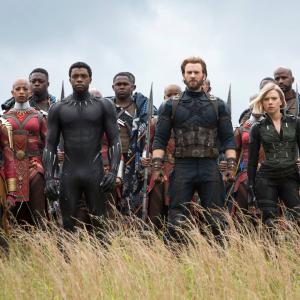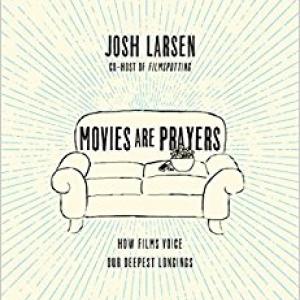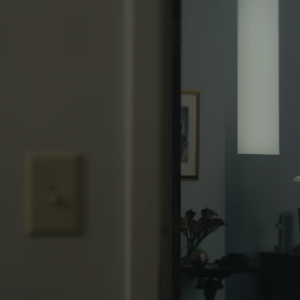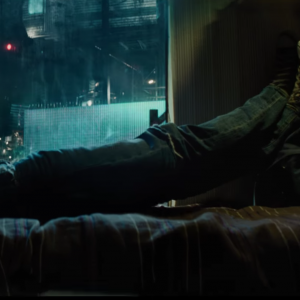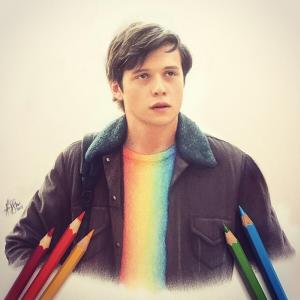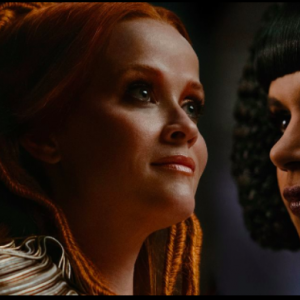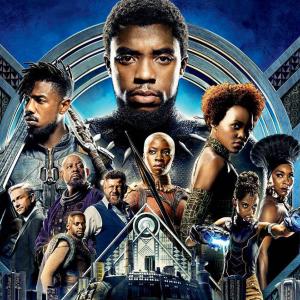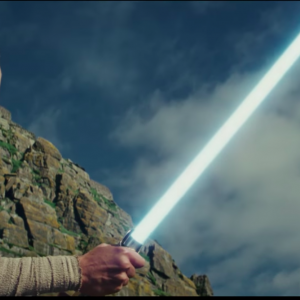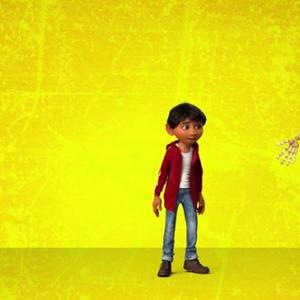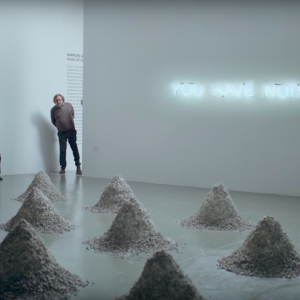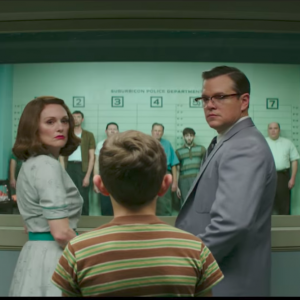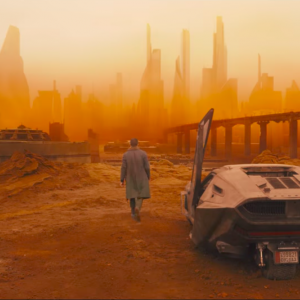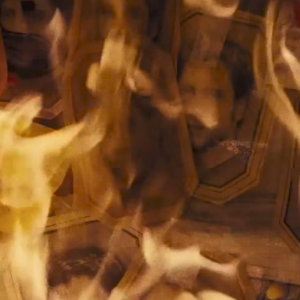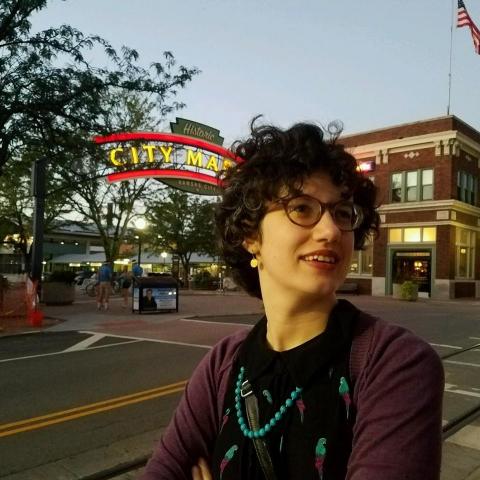
Abby Olcese (@abbyolcese) has been many things — a campus ministry leader at the University of Kansas, an English teacher in Prague, and an advertising assistant at Sojourners. These days, she’s a freelance writer based in Kansas.
Raised on a diet of Narnia, Bob Dylan records and Terry Gilliam movies, Abby is drawn to the weird, the nerdy, and the profoundly artsy corners of popular culture. She loves sharing this knowledge with others by writing about interesting new releases as well as lesser-known gems.
Abby is also passionate about the intersection of faith, social responsibility, and culture. She believes in the power of art to spark important conversations, inspire social change, and help people to better understand life in the kingdom of God.
When she’s not watching movies or writing things down, you can usually find Abby reading comic books or perusing the selection at her local record store.
Posts By This Author
What ‘Avengers: Infinity War’ Teaches Us About Uncertainty, Loss, and Sacrifice
Previous Avengers movies were about the challenges of building and sustaining and a community. Infinity War is a sobering reminder that even the biggest, strongest communities sometimes face adversity that results in sacrifice, uncertainty and loss. This is the MCU’s equivalent of C.S. Lewis’ The Last Battle, gathering characters both beloved and new, and throwing them into a brutal endgame. It’s a Good Friday movie, too, putting those left standing at the end into their own version of Gethsemane.
Same Beauty Norms, Barely Re-Packaged

Image via ifeelpretty.movie.
I Feel Pretty is mainly a superficial enterprise. There are plenty of opportunities for smart satire here, but co-writers and directors Abby Kohn and Marc Silverstein stick to a simplistic interpretation — one that claims to push for female empowerment, but still remains concerned with looks and a pretty narrow definition of beauty norms.
Finding God in the Dark
Movies are Prayers: How Films Voice Our Deepest Longings, by Josh Larsen. IVP Books.
AS A TEENAGER growing up in a church setting that discouraged engaging with movies, books, or music deemed a “bad influence,” I remember frequently being confused about pop culture, particularly when it came to what films I was “allowed” to watch. Was I wrong for wanting to see Taxi Driver ? For identifying with Saved? Was it a sin to watch The Last Temptation of Christ?
The answer to all these questions, of course, is “no,” but the sentiment behind them is understandable. The easiest metric for Christians to judge a film’s quality is the measure of its “objectionable” content, regardless of what that content says about the filmmaker’s intent, or the political or cultural attitudes under which it was conceived. The truth, however, is that all art—whether spiritual or secular in origin—has something to express about the world: joy in its beauty, anger at its injustice, a whole spectrum of emotions and ideas that reflect the human experience.
Unafraid of Hard Questions
With a mix of art, science, and conversation, The Liturgists welcome the spiritually hungry.
IT’S A WEDNESDAY night in early November and the sanctuary of Redemption Church in Olathe, Kan., is full. The audience, mostly 20- and 30-somethings, is listening in rapt attention to Mike McHargue, better known as Science Mike. Self-proclaimed science enthusiast McHargue, co-host (with musician and songwriter Michael Gungor) of The Liturgists Podcast, is doing a live episode of his solo side podcast, Ask Science Mike, as part of a tour for his new book, Finding God in the Waves.
After questions ranging from the neurological effect of belief on the brain to the role of women in the church, a young man stands and shares his story. He works at a conservative church, he says, and finds his beliefs are starting to differ from the people he works with. Finally, he asks, “When you start to ask big questions, and you don’t know where they’re going, and you don’t know where they’ll take you, how do you find the courage to continue to move forward when you know it might have dramatic consequences?”
“I have terrible news,” McHargue answers. “If this continues, you will not fit in where you are. How do I know? There are a thousand people at a Baptist church, who I love dearly, who could not stand to be in a room with me, because I’m the one who rebelled against the tribe.” He pauses a moment before continuing. “Here’s the other thing. This is good. The way you understood God, that served you for so long, isn’t working anymore because you’re growing. ... So I say, get excited.”
McHargue and his Liturgists Podcast co-host Gungor are no strangers to questions about belief, doubt, and straying from the theological tribe. Both men grew up in conservative evangelical churches, and both men lost their faith as adults, regaining it in a different form later on. It’s an experience familiar to plenty of the millennials and Gen-Xers who make up the “nones,” the growing portion of the U.S. population who have no religious affiliation.
'Come Sunday' Asks What Happens When Faith Changes
Sometimes, the film tells us, there are no good answers. All we can do is sit with our thoughts and do our best to love each other well.
‘Ready Player One’ Confuses Meaningful Nostalgia with Legalistic Knowledge
Unfortunately, that’s not a sentiment shared by the rest of the film. In their quest, Wade and his friends display their encyclopedic knowledge of vintage pop culture as badges to be worn, or tools to be used, rather than pieces of personal meaning. At one point, Sorrento meets with Wade to try and win him over, spouting references fed to him by a lackey in another room. Wade calls his bluff, telling his enemy, “A fanboy knows a hater.” But it’s hard to see much of a difference between the two characters in that moment. They’re both using rote, memorized facts, rather than actual connection, to fuel their conversation and get what they want. The only difference is that Wade had to do the research on his own, while Sorrento has a team doing it for him.
The Message of 'Love, Simon': We All Deserve a Great Love Story
Robinson’s performance as Simon is worth noting in the way it adheres to and subverts teen movie characters we’ve seen before, with particular regard to the master of the genre, John Hughes. Robinson’s got all the charm, looks, and outward swagger of a Hughes leading man, with the inner confusion and insecurity of Molly Ringwald, all rolled into one. He’s the rare effortlessly cool movie teen who doesn’t have it all figured out. And his friends are honest about their own issues, too, providing a refreshing portrait of movie teenagers that hits closer to reality.
A Wrinkle in Time: A Beautiful, But Surface-Level, Film
A Wrinkle in Time is bright and colorful, not only applying broad imagination to its settings and costumes, but also daring to extend that same concept to its diverse cast. In addition to the multiracial identities of the three Mrs., Meg is biracial and the adopted Charles Wallace is asian. These choices clearly come from a very personal place for DuVernay, and it’s lovely to see that diversity communicated with earnestness and intention. A large part of the film’s message is self awareness and self-love and it’s important that this message comes to audiences through the experience of a young girl of color, addressing universal pre-teen feelings of awkwardness or self esteem issues through a character who relates to more than just a white audience.
Welcome to Wakanda
Should we be building walls, or making it easier for people seeking a better life to enter our borders? Should we use our resources to exercise military might, or to fix a system rigged against people of color and people in poverty? Wakanda knows its answer. Perhaps Black Panther can help American audiences reconsider ours.
‘Star Wars: The Last Jedi’ Is an Advent Movie
In this sense, Star Wars: The Last Jedi is an Advent movie. Director Rian Johnson’s wildly fun and thoughtful entry into the Star Wars canon finds its heroes at a precarious turning point. The film makes its characters grapple with the flaws of their established order, consider whether any of it is worth saving, and move forward by embracing the hopeful qualities of the Force and the Resistance.
‘Three Billboards Outside Ebbing, Missouri’ Tackles the Good and Bad of Righteous Anger
Mildred rents the three billboards down the road from her house to cover with messages shaming the local police chief, Willoughby (Woody Harrelson) in hopes of galvanizing the department into action. She merely irritates the sympathetic Willoughby, but infuriates Dixon (Sam Rockwell), a dim officer with racist and homophobic tendencies and an anger management problem. As tensions escalate and anger begets violence (which begets more violence), Mildred and Dixon are each forced to address the deeper issues inside them that fuel their actions.
'Coco' Honors Family, Past and Present
'Coco' functions beautifully as a unifying reminder of the ways family and legacy influence us.
‘The Square’ Is a Bitingly Funny Satire About Human Selfishness
But help is something Christian, and everyone around him, has trouble giving to those who really need it. The Square is full of characters asking for help from unwilling people, including homeless people, charity workers, and women being attacked. Even Christian, an attractive upper-class white guy, can’t get help when his wallet and phone are stolen on the street.
‘Murder on the Orient Express’ Shows How Revenge Doesn’t Mean Justice
Kenneth Branagh’s new big-screen adaptation of Christie’s novel is a diverting, gorgeous-looking film that struggles a little at showing the humbling effect that dilemma has on the great detective. However, it does a good job of portraying the pain at the center of this story, and how it metastasizes in its characters.
'Thor: Ragnarok' Is an Intergalactic Superhero Party and Everyone's Invited
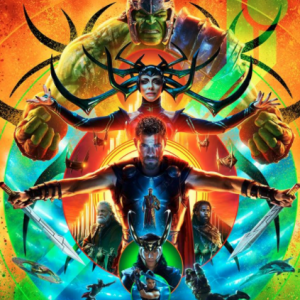
Image via Thor/Facebook.
Much like Thor, many white Americans are only now reconciling with the idea that the narrative we’ve grown up believing cuts out huge chunks of the country’s history. It’s especially pertinent that this perspective comes to us from an Indigenous filmmaker (Waititi is Maori, from New Zealand), whose country has its own long history of racism, and who championed cultural representation on his set.
Clooney’s ‘Suburbicon’ a Needed, but Weak Response to MAGA
George Clooney’s new film Suburbicon is very obviously a response to the MAGA line of thinking. The film uses two parallel stories to explore both the hidden nastiness of the archetypal white, suburban family, and the day-to-day racism faced by an African American family trying to achieve their own American dream. It’s a setup ripe with allegorical potential, but while Suburbicon is built on good bones, it’s an unfocused mess that wastes its opportunity.
‘Blade Runner 2049’ Paints an All-White Future. Again.
Nearly all of the characters K encounters (human and replicant alike) are white. This is in stark contrast to the globalized aesthetic of the city, carried over from the original movie. It could be argued that in a world where a white man like Leto’s Niander Wallace is the one person creating a sizable chunk of the population, it’s not surprising that the creations themselves lack diversity. However, the reality for the film’s casting decisions is likely less about artistic interpretation, and more just plain laziness.
The Troubling View of Communion in ‘mother!’
mother!'s grotesquely literal take on the Eucharist also fundamentally misses what communion means.
From Ferguson, an Intimate Look at a Movement
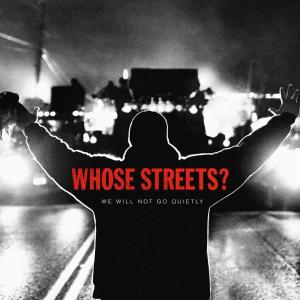
Image via Whose Streets / Facebook.
As filmmaking, Whose Streets is dramatic and powerful. As a historical document, it holds even more weight.
‘Step’ Is Inspirational But Could Be More
It’s a powerful setup, and the girls’ (and their team’s) journeys are inspiring. But it’s hard to shake the feeling that Lipitz is more concerned with crafting a tidy, three-act narrative than with taking an honest look at who these girls are, and the issues they face.
